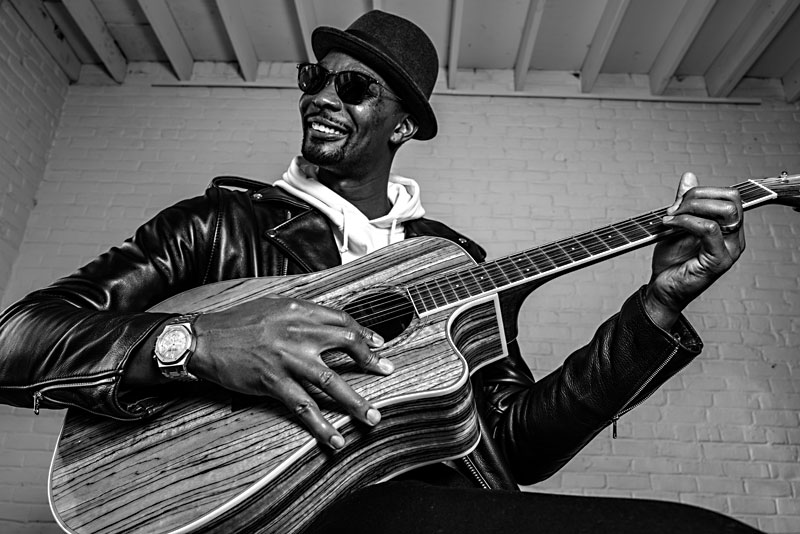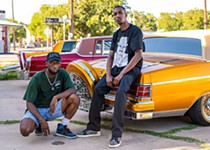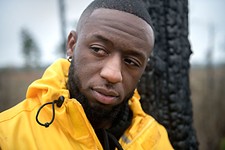NBA Star and Music-Maker Chris Bosh Sets Up Shop in the ATX
The future basketball Hall of Fame forward wants it all
By Kahron Spearman, Fri., March 19, 2021
Initially curious, Chris Bosh's pivot into an Austin-based music producer isn't surprising. Consider the constant rejiggering of the 11-time All-Star and two-time NBA champion's basketball livelihood, especially during his lengthy tenure with the Miami Heat (2010-17). Texan by way of Hutchins outside of Dallas, he's no stranger to pushing through obstacles.
Thrust into a "Heatles" spotlight alongside LeBron James and Dwyane Wade, Bosh, who already enjoyed perennial superstar status as a Toronto Raptor, became the trio member obliged to alter his game for the greater good.
"Not only did I have to reinvent myself when I got to the Heat, but I also had to reinvent myself every year," he said over Zoom locally late last year.
Following a brief vacation in 2015, Bosh received diagnosis of a pulmonary embolism. Blood clots blocked the artery in his lung. That caused pulmonary infarction, a secondary condition causing lung tissue to deteriorate.
In 2016, another clot in a distal vein in his calf concluded his productive career. As one of the great power forwards in NBA history, his tenure will assuredly culminate into a ticket-punching for the Naismith Memorial Basketball Hall of Fame, for which he recently found himself named as a finalist for 2021 induction.
Daddy Jack
Our subject's musical ambitions stem from an encyclopedic love of music. He credits his parents and a grandfather nicknamed "Daddy Jack," for whom his label is named. Armed with the emergent imprint, whose roster includes gifted Chronicle favorite Deezie Brown (see "Slabs, Screw, and Stories from Bastrop County," Music, Aug. 14, 2020, and also "It's a Celebration," Music, Feb. 19), Bosh didn't reconfigure himself as might be required in another city with a hardened musical gate system.
In life – as in music – restarts aren't only allowed, they're encouraged.
As a low-risk, high-reward creatives' haven, Austin is where you come to try some shit out, a place where musical failures aren't counted if even a ledger ever existed. Should his label and music experiment fail, no penalty will be levied within Capital City confines. He'd be another monied, retired athlete trying his hand at music, as so many have before.
No harm, no foul, if the parlance can be allowed.
"I want at least to get in there and go for it," he says. "It's been a challenge, but it has been worth it. We established the record label more than a year ago. It takes time to start establishing yourself and build those relationships."
On his first single, the Brown-assisted "I Want It All," Bosh lets the local rapper expound on his desires to go from amateur to the pros, in analog to his own career:
"We ain't playing 21 no more, we playing 24 hours 'round the shot clock, fadeaway
Still yelling 'Kobe' on the day-to-day, pave the way.
So let's continue to Deebo all the barricades."
Next single "Imitate" represents Brown's truer personal evolution in story and rhyme. However, the music video highlights a head-nodding Bosh alongside the Bastrop native, slowly out of his shell, looking the part of a rapper, albeit the seven-foot variety. Husband to Adrienne and a father of five, Bosh, 37 on Wednesday, discusses processing the end of his basketball career, his still-new musical journey, and why Austin.
Austin Chronicle: The first question I've sat with, but it's pretty simple: Why Austin?
Chris Bosh: My wife. She had the suggestion, "What about Austin?" I was so embarrassed not even to have that thought because I had been there a couple of times in my teenage years, but not as a grown man. Once we came down here, we found a great place and pretty much started my "retirement phase," if you will.
AC: At what moment in this ongoing music experience did you feel like, "Okay, this is going to be my new identity now?"
CB: I pretty much dove straight in. I started learning how to play guitar. I'm savvy with the computer and said, "Let me get some software and start checking that stuff out." Then I began making friends in the industry, started having different conversations I had never had before.
Your appetite starts to grow, and then it's a challenge.
You want to start collaborating with people. You grow as an artist and as a producer. I got to the point where I wanted to put stuff out and kept getting confirmations.
AC: Rico Love – producer for Usher, Beyoncé, Diddy, and more – how did he become involved?
CB: I had met him before, but that was our first time hanging in the studio. I played him some beats, we wrote some songs. Gucci Mane used one of the songs ["Miss My Woe"] for his album, Mr. Davis. Once that happened, I said, "I have to follow this. I'd be crazy if I don't follow this. That's like ignoring the signs." He's been a great friend and mentor.
AC: Obviously, COVID makes everything difficult, but how have you been integrating yourself into the Austin scene?
CB: It's been great, to be honest. We'd heard about the live music scene the first time we came down, so I was just excited to see live shows. That Southern hospitality is still alive, and it's still well. Meeting people, just having genuine connections with them, we weren't worried about making music right away. We don't have that pressure.
Now, I try to be in a situation where the artists can be themselves too.
I always like to get to know the person that I might be working with first before I even play any music or talk about music, so we're always having conversations with new people about new things, just naturally through asking the right questions, meeting the right people. We're steady, working on the Rolodex, and trying to bring that solid reputation to what we do.
AC: How'd you connect with Deezie Brown?
CB: I read an article. My wife tore it out of a magazine. She said, "Well, you've been talking about working with local artists. Here's this article." It was about [KUTX] radio show The Breaks. I listened to the artists, and he became my favorite of the bunch, so I decided to cold call him.
AC: You realize how unusual that is, right? "Hey, we don't know each other, but I'm 11-time NBA All-Star Chris Bosh and I'm a fan."
CB: [Laughs] I always tell folks, "I know, man. I know. I'm just trying." I know this is probably strange and unusual, but you got to go for it.
AC: Listening to your music, it's clear you're not messing around, not trading on your name. Did you have those concerns coming in: "They're going to say this is dope, but do they believe it?"
CB: When I first started, I only played it for genuine friends. I don't play music for random people. You know how it can get weird sometimes in those atmospheres. A good friend of mine, I wanted to play some music for him, but he was dodging me. I didn't know he was avoiding me at the time [laughs], but he kept putting it off.
You can tell if it's wack or not by the look on people's faces. Eventually, we listened to it together. The look I kept getting was like, "This is alright, man."
I guess it's like this industry thing – ballplayers trying to make music [laughs] – so it was strange. I respect the music and I appreciate people that do it, the people that mentored me. I appreciate the craft, I respect the artistry, and I'm not in it just to "play beats, and hopefully, somebody will bob head."
I want to make great music.
AC: You've lived in Austin three years now. How do you find the creative atmosphere here?
CB: It's like this jumbled up thing, in my opinion, on the outside looking in, that nobody knows how to describe or define yet. I think Austin is still growing and trying to find its identity on top of what it was, growing into what it's about to be. Of course you have Texas blues and country influences down here, but then you also have pop and the huge indie scene.
Now that there's one radio hip-hop show, maybe there'll be two [laughs].
Austin is not used to being a big city. I think it's a big city now. I feel it's reckoning a new phase. The music is still figuring itself out. Everybody has those genres that they try to classify themselves in, or people put them in.
AC: Austin still feels malleable. If you landed in Atlanta, there's this whole built-out ecosystem.
CB: That's what's exciting about it. I've had to rebuild myself and my situation so many times throughout my life and career. It's exciting when you see something that either nobody knows about or something that's still fresh. This was naturally a place we wanted to be. I've got five children, so it's a massive part of the decision-making. But the [travel possibilities] are great, too. It's two-and-a-half [hours] to L.A., about two to Atlanta.
AC: Let's talk about the musical traditions you came up in and how your father influenced your tastes.
CB: I grew up in Hutchins, Texas, just south of Dallas. There's a radio station called The Oasis 107.5[FM], one of the quiet storm stations – Kenny G, smooth stuff. My dad loved Sade, George Benson. He was huge on moods, if you can't tell.
On top of that, my dad is a big jazz fan. We would go to this thing called Jazz in the Park. We had enough to get a burger. We'd have a blanket, put it out on the concrete, and watch jazz music at the art center. It was mind-blowing.
Then I might go over to my grandma's house and she's playing AM radio. There's Texas blues, Albert King, Freddie King, B.B. King. Then, my mom played Patti LaBelle and Motown, because she's originally from the Midwest.
Then, of course, you got Whitney Houston, Toni Braxton, and that whole era in the late Eighties and early Nineties.
AC: Of course, we have to talk a little hoops. Do you come from a family of athletes?
CB: No, we were more so brainiacs and hard workers. I had an uncle that played basketball, but nothing serious. When I was younger, at that time, it was more about getting work done so you can go to college instead of playing basketball.
My father instilled discipline in us and made sure that we were doing what we're supposed to do. Once he saw how serious I was about basketball, he was all for it. But he mainly focused on it because of the possibility of a scholarship.
AC: How real was that pressure for you?
CB: He told me straight up, "I don't have the funds to pay for college. You need to get a scholarship." [Laughs]
AC: Is this where the light came on for you?
CB: It was more of the obsession, you know what I mean? He saw how obsessed I was about it, how relentless I was. I knew I was pretty good right away, but that's only because I was always playing.
AC: You wrote a book with Ryan Holiday, Letters to a Young Athlete, coming out in June.
CB: It's my reflections on what helped me get through situations, giving examples from players like LeBron [James] and Dwyane [Wade], Shane Battier, and Candice Parker, who's a living legend in the game. A lot of good friends and ex-teammates. It provides examples of putting the work in, having a rigid mindset, and visualizing success. I'm taking those principles and my own experiences and breaking them down into stories. It's kind of a manual for anyone striving for something.
AC: Lastly, you haven't officially crossed the threshold yet, but you're going to the Basketball Hall of Fame as a virtual lock. Are you fulfilled with how your career went, especially given it ended much sooner than you would've liked?
CB: It was a masterpiece. One of my favorite artists and inventors is Leonardo da Vinci. I've read everything about him, and people don't know a lot of his work was unfinished. Even with the masterpieces, most of the works he did were unfinished in his eyes.
I have come to admire that about my career: It was unfinished.
I did everything I was trying to do. Everything after that was pretty much going to be the icing on the cake. I'd say, "Okay, I'll get 20,000 points, 10,000 rebounds," and "I'm going to be number whatever on the scoring list and hopefully, get another, or chase another championship one day."
It didn't happen. That was out of my control. But it was just putting more on top of more.
AC: You're incredibly pragmatic about the outcomes.
CB: I did it all. I couldn't ask for anything else. I'm a producer, and I'm a father. I'm trying to fall into those roles and make sure I'm not blowing it there [laughs]. That's allowed me to move on, and I've come to appreciate it.
It took a long time to get there, and it wasn't easy. But I'm glad things have happened the way they've happened. I have no regrets.












